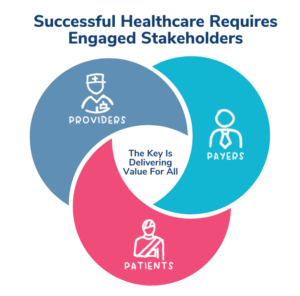Creating the Triple-Win of Healthcare
This article is one in a series that advocates the need to bring specialty care under value-based care payment models. Click here to read the previous article, Primary Care and Specialty Care Work Better Together.
There’s a problem in our midst. It’s provider burnout.
Clinicians are exhausted. You can see it in their eyes. They entered the profession to help people, and they’re now spending up to 25% of their time on administrative duties, according to an article in the Continuing Education Journal.
Increasingly they’re tasked with entering data, chasing down needed information, filling out forms, and performing other manual tasks—work they didn’t exactly sign up for when they entered the medical field.
The situation impacts both primary care doctors and the specialists that serve us every day. But importantly, it is also having negative effects on the patient experience—and on payers’ ability to operate as efficiently and effectively as possible.
In short, the current scenario is impeding the U.S. healthcare system’s ability to achieve the goals of the Triple Aim of Healthcare. Only when all parties involved—patients, payers, and providers—are receiving value can we consider our approach to keeping our population healthy a success, or a Triple-Win.

The Fee-for-Service (FFS) Model Isn’t Working
In addition to increasing administrative responsibilities, Covid-19 exacerbated physician’s stress levels, and continues to. Doctors are unhappy in their jobs and is a critical issue for us all. The reality keeps us from achieving the Triple Win, while impacting quality, access, and cost of care across the continuum.
In 2021, the largest-ever exodus of doctors occurred, with more than 330,000 healthcare providers leaving their jobs, according to information published in Medical Economics. The article predicts that the U.S. could see a shortage of 54,000 to up to 139,000 physicians this year.
Caregiver burnout and the resulting shortage of providers will continue as long as inefficient, costly fee-for-service (FFS) payment models remain in place.
Value-Based Care (VBC) Contributes to Better Morale
The solution to the problem of unhappy providers is making the switch from FFS to Value-based Care (VBC). VBC holds the key to keeping physicians engaged, and in turn contributing to better, more affordable care.
Enlace’s VBC solution is already making significant inroads needed to put a halt to physician burnout. The company has a demonstrated track record of minimizing the fatigue of those who deliver healthcare by innovating in the following ways:
- Putting the right incentives in place systemwide to reward providers financially when better patient outcomes are achieved.
- Eliminating outdated payment models that pay based on volume of services provided—and lead to unnecessary treatments, stressed-out clinicians, overwhelmed facilities, and cost overruns.
- Providing access to tools that let physicians leverage insights derived from aggregated data; and implementing the automated, connected, secure processes across the care continuum that let doctors do better for those who count on them.
The Time Is Right for VBC
The Triple Aim is an important goal. To achieve it, providers must be able to focus on what they do best, which is taking care of patients. This is a worthy endeavor for the U.S. healthcare system, and VBC is critical to making it happen.
Primary-care physicians and specialists need to work in an environment without the distractions that come with outdated, cumbersome ways of delivering care: Where there’s never enough time; where there are information gaps across the board; where the pressure’s on to spend time doing tasks that don’t contribute to better health. In that environment, job satisfaction takes a toll.
Instead, it’s necessary to take an approach that gives providers the tools they need—data and insight at their fingertips, and incentives to do the right thing in caring for the whole person. When Orthos, for example, get the personal and population data and ready access to MRIs they need to let them make appropriate diagnoses and care plans, they’re more productive, they feel more fulfilled, and their patients fare better.
What’s good for any one party in the Triple-Win of Healthcare equation is good for everyone. Value-based care can make it happen. How? By improving patient care outcomes, saving money—and steering physicians clear of the burnout that takes all of us further down the wrong path.
Keeping doctors satisfied is just one more reason value-based care is the way to go, now.
References:
Fighting burnout through value-based care
5 causes of physician burnout and how to address them
Addressing the healthcare staffing shortage
The Link Between Administrative Burden and Physician Burnout
 ASK ENLACE
ASK ENLACE